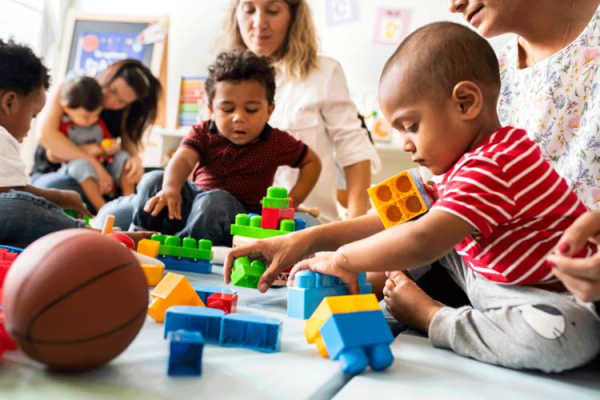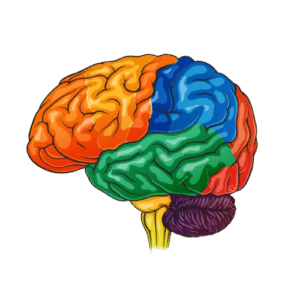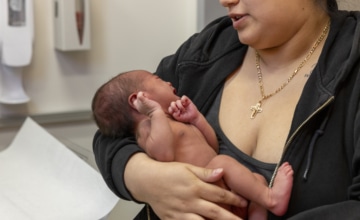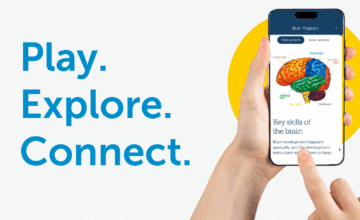Promoting Early Development: Building a Strong Foundation
During the earliest months and years of life, the architecture of the brain is being built at an unparalleled rate in response to nurturing early experiences. Caring adults have a wonderful opportunity to foster feelings of trust and safety in babies, which helps toddlers establish a sense of self and become confident explorers.
Research shows that, to ensure a good start in life, all infants and toddlers need good health, strong families and positive early learning experiences.
Developmental milestones
Primary caregivers must be responsive, consistently meet their child’s needs and ensure they reach various developmental milestones at the right age. Here are the most critical milestones in infant development:
- Speech and language development: These milestones include various forms of communication, from crying to constructing simple sentences.
- Movement and physical development: Movement milestones from birth to three years old usually include rolling over, crawling, walking and running.
- Cognitive development: Early childhood cognitive growth often consists of problem-solving and thinking, such as sorting shapes and following instructions.
ZERO TO THREE's strategies
Using evidence-based frameworks, we create resources for parents, professionals and policymakers to support early childhood development. Our team of experts raises awareness among parents and providers about the importance of early intervention services.
Here are some of our initiatives:
- HealthySteps: This interdisciplinary pediatric primary care program encourages the health, well-being and school readiness of children from birth to three years old.
- Safe Babies™: The approach of this initiative is to prevent maltreatment and neglect of babies and toddlers to keep families together during these critical formative years of a baby’s life.
- Military Families: Through an app and resources, we help military families and professionals support and care for babies and toddlers of deployed parents, who are more vulnerable to mental health issues.
Approximately 16% to 18% of children have disabilities or developmental delays.
Infants and toddlers who have been maltreated are six times more likely than the general population to have a developmental delay.
1 in 3 infants and toddlers who received early intervention services did not later present with a disability or require special education in preschool.
Source: ZERO TO THREE (2010, February 8). Making hope a reality: Early Intervention for infants and toddlers with disabilities.
Science tells us that early experiences really do matter, and the connections that we have with the caregivers in our lives make a real difference in how we see and understand the world. ZERO TO THREE occupies a unique position in the early childhood landscape. We focus on a relatively small age range, but our reach is broad—from family, to policies, to all the service settings that touch the lives of infants. In terms of giving voice to the needs of babies, we don’t leave any stone unturned.
Brenda Jones Harden, PhD, zero to three board president
Policymakers must understand the critical early years.
Resources for parents and professionals
Here are a few ways we equip parents, early childhood development professionals and policymakers with the latest research on early development science:
- Ongoing professional development: To equip a strong early childhood workforce, we offer a range of in-person and virtual events, conferences, early childhood development training, learning center and bookstore resources to help professionals make a positive impact on young lives.
- ZERO TO THREE Member Content: Whether you serve children and families, manage programs, or shape early childhood policy and systems, our Member resources provide the latest research and insights to support early development.
- The Earliest podcast: Our podcast explores the critical role of caregiver and infant mental health in early development.

The Growing Brain: From Birth to 5 Years Old curriculum, led by Katrina Macasaet, helps early childhood professionals explore the science of brain development.

ZERO TO THREE's Baby Brain Map
Our “Baby Brain Map” is designed to educate parents, caregivers, and early childhood professionals about the critical stages of brain development in young children from birth to three years old.

This tool provides an engaging, user-friendly way to explore how babies’ brains grow during these formative years, emphasizing the impact of experiences, relationships, and environmental factors on neural development.
Related Resources

How do infants translate sounds to language?

Yes, Mental Health Includes Babies
Be a Baby Champion
Explore our science-based resources, attend events and advocate for policies that support early intervention and family engagement so we can ensure every child receives the strong start they deserve. Get involved today or explore our comprehensive resources for more.

